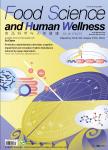Elucidating the Role of Probiotics in Modulating Depression Pathophysiology: Insights from Animal Models and Clinical Trials-A Narrative Review
作者机构:Guangdong Provincial Key Laboratory of Utilization and Conservation of Food and Medicinal Resources in Northern Region, Shaoguan University College of Food Science, South China Agricultural University Department of Psychiatry, The Third Affiliated Hospital of Sun Yat-Sen University
出 版 物:《Food Science and Human Wellness》 (食品科学与人类健康(英文))
年 卷 期:2024年
核心收录:
学科分类:0832[工学-食品科学与工程(可授工学、农学学位)] 1002[医学-临床医学] 08[工学] 083201[工学-食品科学] 100205[医学-精神病与精神卫生学] 10[医学]
基 金:supported by National Natural Science Youth Fund of China (32302107) Guangdong seed industry revitalization project ( 2022-WPY-00-008 )
摘 要:With the ongoing COVID-19, a significant increase in global depression rates has placed a considerable strain on healthcare systems. Conventional pharmaceutical methods have shown limitations in treating this rise in depression. Therefore, identifying new potential treatments for depression is crucial. Maintaining a balanced gut microbiota is vital for human health and immune system function due to its complex bidirectional relationship with the brain. Numerous studies have established a robust correlation between anxiety and depression disorders, as well as the composition of microbial communities in the gastrointestinal tract, providing a fresh perspective. Adjusting the balance of gut microbiota may help alleviate depression symptoms. Probiotics, live microorganisms in the human gut, can improve the microbial community, help maintain homeostasis and stress resilience to remission in patients with depression. It’s essential to explore how probiotics affect gut microbiota since their impact can differ between animal experiments and clinical trials. The variation in results may be attributed to factors like the probiotic type, administered dosage, and treatment duration. The purpose of this review is to summarize the potential mechanisms by which probiotics affect gut microbiota, drawing from recent animal and clinical studies and observations on gut microbial ecology shifts. Additionally, this review will spotlight effective probiotic species for depression relief and discuss treatments centered on restoring gut microbial balance. Furthermore, it will also discuss the potential of probiotics on host microbiota in other organs to improve depressive symptoms and demonstrate the transient nature of the need for a more nuanced understanding of the safety and potential adverse effects of probiotics.



